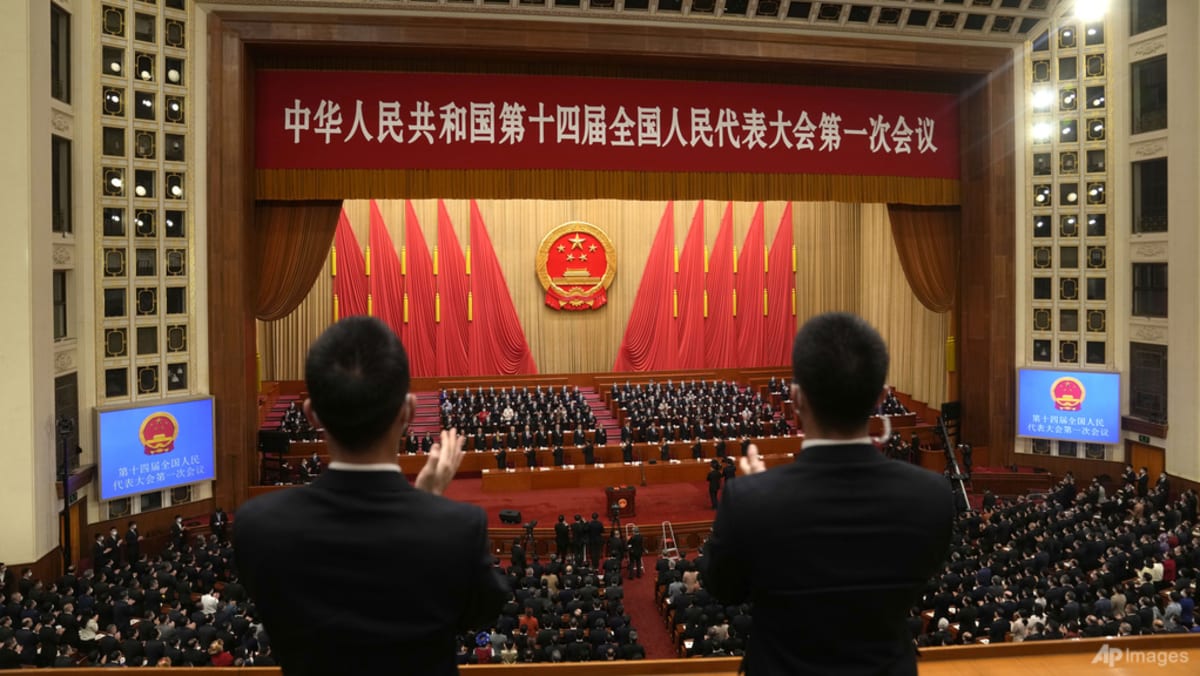
China’s legislature confirmed continued leading roles at the central bank and the finance ministry for Yi Gang and Liu Kun, as the country doubles down on tackling stubborn financial risks and technological bottlenecks in President Xi Jinping’s third five-year term.
The retention of the two senior officials, both past the retirement age and no longer members of the Communist Party’s elite Central Committee, also suggested a new political logic, with the decision-making power shifting to the party apparatus, analysts said.
The officials were nominated by Premier Li Qiang and confirmed by the National People’s Congress on Sunday (Mar 12).
Also confirmed as vice-premiers are Ding Xuexiang, He Lifeng, Zhang Guoqing, and Liu Guozhong. Zheng Shanjie was nominated to replace He as chairman of the National Development and Reform Commission, the top economic planner.
The ministers for commerce, agriculture and technology will also stay in the next cabinet.
Analysts said the new financial line-up would have to continue the heavy task of defusing deep-seated problems in the world’s second-largest economy, managing fallout from overseas policy and funding the country’s technological ambitions.
The team could also usher in advances in overseas use of the yuan, digital currencies and international payment systems under the umbrella of “development security”.
Wang Jun, chief economist at Huatai Asset Management, said cabinet officials were increasingly seen as implementers, with their age and political status less of a consideration.
“The [nominees] are capable technocrats. This also reflects the intention of top leaders to maintain policy continuity and stability,” he said.
Yi, 65, a former associate professor at Indiana University-Purdue University Indianapolis and professor at Peking University, refrained from big stimulus and held consumer inflation at only 2 per cent last year, a sharp contrast to the 40-year high inflation in most Western countries.
“Senior positions like central bank governor should have solid macroeconomic training and deep understanding of modern monetary policies. Otherwise they are prone to making mistakes,” said Chen Zhiwu, a finance professor at the University of Hong Kong.
Chen said better controls might make the regulatory regime more efficient, but it would also reduce the room for financial reform and innovation, and might bring new risks over the next five years.
“Financial practices may turn highly homogeneous at the national level and across the country,” he said.
“The financial resonance of various regions, if economic problems occur, would make macroeconomic and financial risks even greater.”
Beijing has made the prevention of systemic financial risks a top priority since 2018.
To that end, regulators coordinated by the Financial Stability and Development Commission dismantled the financial empire of tycoon Xiao Jianhua, restructured national joint-stock bank Hengfeng and financially troubled small banks, and shut down thousands of peer-to-peer lending platforms.
But Xi has continued to express great concerns about financial risks.
At the closed-door central economic work conference in December, he specifically mentioned financial risks associated with the property market crisis and government debt.
He also raised the alarm about financial risks in a meeting with political advisers attending the “two sessions” last week, highlighting the threat of “detonation” from corruption and inadequate supervision.
In its annual macroeconomic policy assessment report, released online on Thursday, the Chinese Academy of Social Sciences’ Institute of Economics warned that systemic financial risks and instability were rising, while some small- and medium-sized financial institutions faced threats to their liquidity.
“As for now and the foreseeable future, it is necessary not only to prevent the risk of excessively rising macro leverage ratios, but also to guard against the risk of deleveraging caused by large fluctuations in housing prices,” it said.
As part of efforts to contain that risk, the authorities have announced plans to restructure the regulatory regime, including the creation of a national financial regulatory administration.
Raymond Yeung, chief Greater China economist at ANZ Bank, said: “The institutional reshuffle has strengthened Beijing’s direct control of the whole financial system.
“It is also a sign that de-risking will enjoy a high priority over the coming years.”
At the same time, Chinese authorities have tried to retain foreign investment amid efforts by the United States to step up technological containment and economic decoupling.
Overseas investors owned about 3.2 trillion yuan (US$461 billion) of the A-share market by the end of last year, or about 4 per cent of the total, while they also owned 3.39 trillion yuan of Chinese bonds – or 2.7 per cent of the total.
But the Chinese authorities have also stepped up criticism of US dollar “hegemony” and are developing a yuan-denominated payment system and a central bank digital currency and promoting greater use of the Chinese currency among countries involved in its Belt and Road Initiative.
Regulators are expected to continue de-risking in key institutions this year as bad assets have accumulated, take concerted regulatory action with the enactment of a financial stability law this year, and monitor potential negative spillover effects from international markets closely, according to a report released by Bank of China on Thursday.
Externally, “China should speed up the establishment of dynamic response plans and continue to improve the risk monitoring and early warning system”, it said.
This article was first published on SCMP.
https://news.google.com/rss/articles/CBMibWh0dHBzOi8vd3d3LmNoYW5uZWxuZXdzYXNpYS5jb20vYXNpYS9jaGluYS1saS1xaWFuZy1ub21pbmF0ZS1jZW50cmFsLWJhbmstY2hpZWYtZmluYW5jZS1taW5pc3Rlci1zdGF5LTMzNDEzNjHSAQA?oc=5
2023-03-12 03:02:26Z
1808159758
Tidak ada komentar:
Posting Komentar